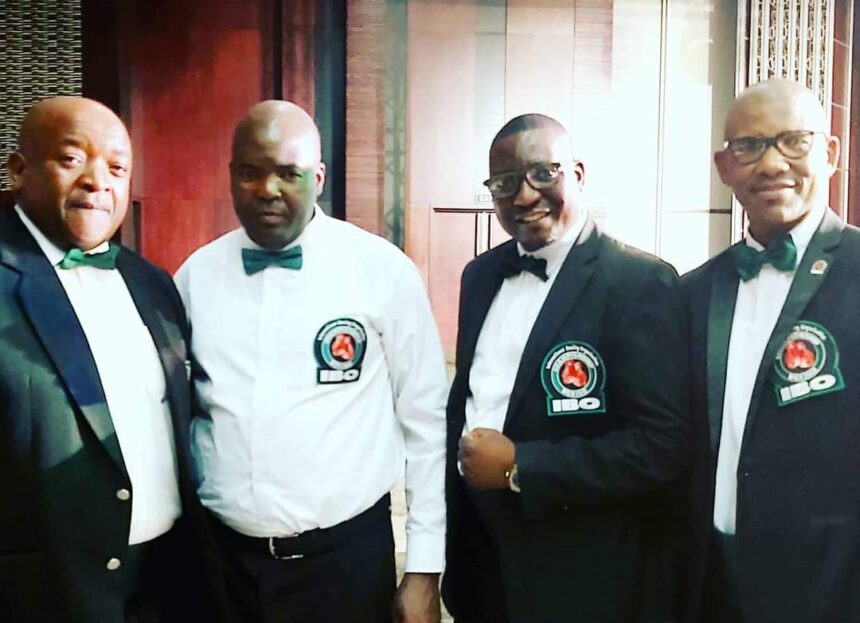Lazarus Nainda, a name well-known in Namibia’s boxing circles, has carved out a unique career path from the boxing ring to the radio studio.
Born in Oshakati, he first made his mark as an amateur boxer. He later transitioned to a boxing official, where he achieved notable success as a World Boxing Association (WBA) referee and judge.
His career in boxing has been marked by overcoming significant challenges, including gaining international recognition and navigating the complexities of local and global boxing scenes.
We recently sat down with the renowned boxing official to share his journey.
Who inspired you to pursue a career as a boxing official?
To be honest, I became a boxing official because I love boxing, and always wanted to be part of the boxing family in Namibia.
Can you share your journey of becoming a WBA official in Namibia? How did you get started in this career?
When I was younger, still in high school, I used to be an amateur boxer until around 1994. I also played football as a goalkeeper at that time. I broke my collarbone while playing for Oshakati City at Oshakati Independence Stadium – and from then on, I stopped boxing. However, I still loved boxing, so I decided to pursue a career as a boxing referee and judge.
I remember well that I received my first training from the late Stanley Sono from South Africa at the Katutura Teachers’ Resource Centre. From there, my career as a professional boxing referee and judge took off.
I started officiating local fights until I gained enough experience to officiate international bouts as well. Currently, I am a qualified referee and judge for the WBO, International Boxing Organisation (IBO), WBA and International Boxing Federation (IBF).
What were some of the biggest challenges you faced while coming up in the boxing world?
My biggest challenge was that after completing our first professional course and being awarded certificates at a fight held at the Windhoek Country Resort and Casino by the former Prime Minister, the late Theo Ben Gurirab, it took me a few years to penetrate the boxing ring as a referee and judge. Another significant challenge we face as professional boxing referees and judges is the lack of opportunities to attend international conventions of different boxing bodies around the world. To receive world recognition, we need to attend these conventions, but there is no funding available for us to do so.
In your opinion, how has the boxing scene in Namibia changed over the last 10 years?
To me, there are two perspectives. Looking 10 years back, boxing did not have enough sponsors, yet more tournaments were hosted back then compared to now. Nowadays, the sport has developed well and receives major sponsorships, but hosts fewer tournaments.
What are the main differences between boxers from seven years ago, and the boxers we see now?
The main difference is that today’s boxers have the advantage of modern facilities, compared to those from the past.
Why do you think Namibia has struggled to produce another world champion in recent years?
This is a difficult question to answer definitively. There may not be a single valid reason for why we are struggling to produce another world champion. However, I believe it is just a matter of time before we do.
What is your take on the current state of boxing in Namibia?
Boxing in Namibia has a bright future ahead. I believe it will become the number one sport in the country, if it isn’t already.
What is the most money you have made from your career as a WBA official? Do you think it is a career worth pursuing for someone looking at it from the outside?
Maybe that was when I officiated the IBO world title fight between Nkosinathi Joyi and Ayanda Ndulani at the International Convention Centre in East London, South Africa. In other countries, like overseas, it can be a career worth pursuing. But in our country, it should be seen more as a hobby.
What does it take to become a boxing official, and what advice would you give to someone interested in this career?
You need self-motivation, determination and self-discipline. In our country, it is more challenging since we know each other very well – from the boxers to the promoters. Therefore, you need to focus to avoid biases. My advice is that one should really have a strong character to become a boxing official in this country. You need to stay focused, and make decisions based on what you see in the ring.
What is the most interesting aspect of your job, and what do you find the most challenging or least enjoyable?
The most interesting aspect of being a referee and judge is that you get opportunities to meet different big names in the boxing world. As I mentioned earlier, the most challenging part is making decisions, especially when handling local bouts.
Quick Quiz:
Lucas Ndafoluma or Jeremiah Nakathila?
To me, they are totally different from each other, and everyone has his unique boxing style. Therefore, I would rather say both.
Harry Simon Junior or Fillipus ‘Energy’ Nghitumbwa?
They are also totally different to compare to each other – both powerful and skilled.
Nestor Tobias or Immanuel Moses?
Tobias is a veteran promoter, and has a lot of experience. Moses is also doing great things.
Paulus Ambunda or Paulus ‘Hitman’ Moses?
In this case, both boxers have their own strengths.
Hedison ‘Bulelo’ Nghipondoka or Nathanael ‘Natty’ Kakolo?
Kakolo has more experience than Nghipondoka.



